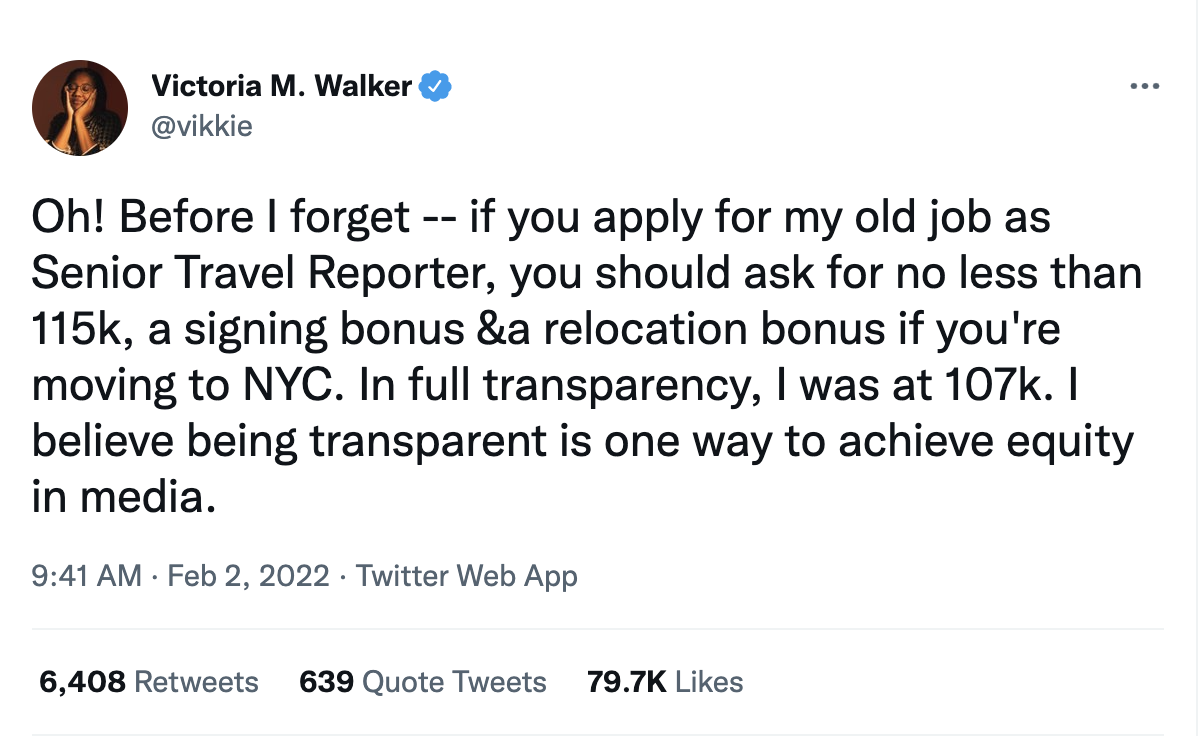I hit send on a tweet in my hotel room at the Park Hyatt St. Kitts just before heading to the beach to unwind after leaving my job. Like millions of Americans nationwide, I joined the so-called “Great Resignation” to rest for a while after more than a year covering the pandemic’s impact on the travel industry.
I had no idea the tweet would spark larger conversations about salary transparency and equity at work.
I wanted whoever applied to my old job as the Senior Travel Reporter at The Points Guy, a travel media website, to know what they should request: at least a $115,000 base salary. (I was making $107,000 when I left the job, but I started as a writer in 2019 making $82,000.) For candidates who weren’t as familiar with negotiating a salary, I also mentioned that I’d received a signing bonus of $5,000 and a relocation bonus — two perks that were incredibly useful when I moved from Washington, D.C., to Brooklyn in the summer of 2019.
Related Reading
I chose to tweet it to my then 14,000 followers just in case a potential applicant saw the role but didn’t feel comfortable reaching out to me for salary advice, as asking a complete stranger what they were paid is, at best, awkward.
I didn’t expect the tweet to go as far as it did, even though I’d tweeted it out to my thousands of followers. I debated even sending out the tweet as I’d resolved earlier this year to be less online in 2022.
But wage gaps persist for people of color and women — in journalism and across the job market — and keeping salaries a secret doesn’t help anyone but employers. In fact, it gives companies ample opportunity to take advantage of applicants just looking for their next gig. (The listing for my previous job at The Points Guy — the company prefers at least five years’ experience as a reporter for the role — has a salary range of $60,000-$90,000 for the mid- to senior-level position.)
The travel media and points and miles spaces I’ve spent the last few years in are tight-knit communities. We see each other at the same press events and media happy hours. But, unless a colleague specifically asks, the topic of pay doesn’t generally come up over hors d'oeuvres. I’ve been guilty of this, too, preferring to keep my salary to myself in fear that it could be considered impolite or gloating.
In some ways, the response has been a shock to me. I’ve been accused of “complaining” about my old job by some and hailed as a “queen” for choosing to publicly disclose my salary to the world by others. But the overwhelming number of reactions got me thinking: Why is talking about money considered impolite? Why is the money we make a secret? And why, in journalism, a profession devoted to transparency as I noted in the Twitter thread, is sharing your salary so taboo? The more information we share, the harder it will be for employers to lowball offers.
Journalists in and outside of travel media trying to negotiate their salaries are often at the mercy of platforms like Glassdoor, Google searches like “How much do travel writers make?” or informal whisper networks.
Travel writers make an average of $73,250 per year, according to figures from the recruiting website ZipRecruiter.com. The average increases slightly to $82,154 in New York City, where I live. Since the tweet, a handful of fellow travel writers reached out to me, expressing shock that the profession could pay in the six-figure range, as many travel publications rely heavily on freelance writers to fill their magazines and websites. I knew my salary was seen as an anomaly even before I left, but it was confirmed when several writer friends told me they hadn’t cracked that number at all during their careers.
My reasons for sharing my $107,000 yearly salary were pretty simple: I wanted the next person in the role to ask for (and hopefully get) what they deserved in compensation and in other benefits. Tweeting out my salary is also a way of holding up my end of the bargain to try and make travel and media covering the industry more equitable. In the summer of 2020, travel, like many industries, faced a much-needed reckoning about race, diversity, and inclusion. With starting salaries so low that some early-career journalists apply for food stamps to make ends meet, it’s really difficult for people who don’t have family money to fall back on to break into the industry.
That is especially true for women and journalists of color. For instance, a 2019 pay study from the Washington Post Newspaper Guild found that employees of color were paid less than white men, even when their salaries were controlled for job description and age. Sharing salary information isn’t the only thing that has to happen to reduce pay gaps, but it will go a long way to exposing the inequities at play.
The tweet prompted other journalists to share their salary histories publicly, but as one user noticed, most of the responses were from other women and people of color. By keeping salary histories a secret, women, people of color, and younger journalists suffer the consequences, and it’s harder for them to achieve parity down the line. My hope is that other non-marginalized groups share their pay with their coworkers.
I didn’t intend to start a discussion. Still, if it forces companies to be more transparent about salary floors and not waste potential candidates’ time, then I’d do it again in a heartbeat. I’m glad choosing to share my salary publicly sparked conversations about transparency in the workplace. However, I’ll be even happier when it results in some meaningful action — and that sharing your salary publicly isn’t such a radical idea.



